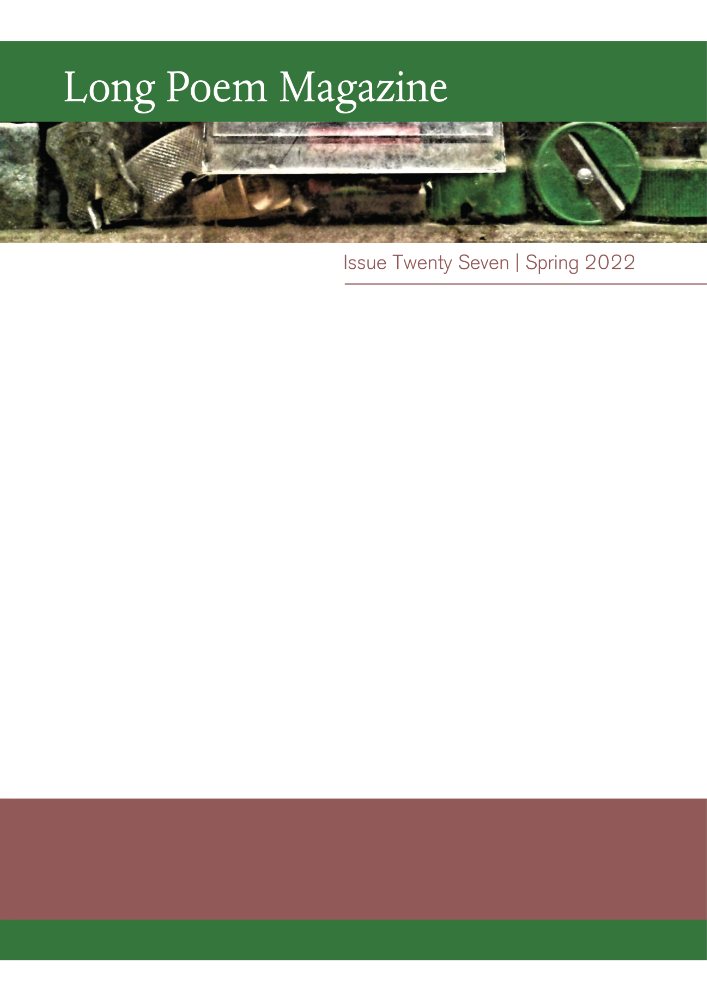Allow me to introduce you to a character from the second half of this issue – his name is Martin Eden, ‘the eponymous blue collar aspiring writer’, namesake of Jack London’s 1909 novel, and ‘London’s fictional alter ego’. Alan Morrison’s ‘biographical narrative’, ‘Brilliant Blaze’, pinpoints London’s ‘struggle of all life/Against death’, and his personification of death as ‘The “Noseless One”, the skull beneath the skin’. Penelope Shuttle addresses the subject of her poem ‘little table’, ‘in the vicinity of grief . . . In the last month of my hundred-year-old Mother’s life’, and little table speaks back: ‘love me or lose me/said the little table, going by’.
Cat Woodward’s ‘theatrical poem’ ‘William of Norwich’ is a tale of murder foregrounding multiple voices, each a party in ‘a rhetorical contest against the other’. In 1144, the body of William, aged 12, is discovered in Thorpe wood. His corpse speaks out: ‘Where have I gone?’ As does the Well (which contained the bones of 17 people; six adults, 11 children and a cat, all thought to be from the 12th/13th centuries): ‘WOWOWOW/OWOWOW WOW’. ‘The People’ speak as one; ‘Look you, in our eye,/we dast you, talk your slaver and squit.’ Joseph Ben Solomon addresses the city: ‘Leaning in, one hears the sound of minds snapping’. ‘Who’s this?/Pim pom skilly, kitten and pie’, asks his daughter Licoricia.
In the first poem of Jude Rosen’s ‘The Coroner’s Sequence’, which focusses on the Chinese government’s denial of the existence of the coronavirus, ‘Li Wenliang’ had ‘no voice’:
there is no individual or plural
– all is one and one is all –
Li Wenliang didn’t exist at all.
The second poem ‘The Rumormonger’ gives him a voice; ‘I think a healthy society should not have just one voice / Li Wenliang told Caixin’, not long before his death from Covid on 7th February 2020 aged 34.
Jessica Mookherjee’s ‘Tyburn Blossom’ is quite a character, observed roaming the streets of North London: ‘Puss in Boots on the night bus’, ‘green girl’, ‘urchin, / doxy. Cut-purse, foot-pad, felon …’ ; ‘bit-faker blabbing for a break’, ‘zipping up a no-good heart that knows/it’s somewhere under all the books she stole.’ Look out for her.
Maitreyabandhu speaks with no assumed persona, allowing ‘flashbacks and flashforwards’ to enter his poem ‘The Commonplace Book’. ‘Themes emerged, along with key motifs’; ‘characters took on a life of their own’ – family members, Basho, Sangharakshita – then, ‘Soon enough, I was including at least one fictional character.’
In Hildred Crill’s ‘Stockholm Streams’ the ‘I’ is immersed in land and language: ‘I try my awkward best to form sounds that summon earlier English as it was before the Great Vowel Shift.’ ‘What encases the voice and grasps it sent back?’, ‘Words rise /I see them.’ In ‘Mappa Mundi’, Lynne Foote, ‘Blown into birth’, for whom ‘the world is upside down’ exposes the inner voice as it channels Theodore Roethke’s villanelle ‘The Waking’ : ‘I take my waking slow,/travel where I need to go’ whilst attempting to ‘grasp this flawed and various world by its root.’ Frances Presley voices her own experience of walking across East Anglia in her poem ‘Black Fens Viral’: ‘I am filled with bliss to see cloud shadows brush across the dark soil and I am filled with a bliss longing before the field and its animated shadows’; ‘I like to see where I am going says the birder.’
Whilst writing ‘Meaning’, says Javy Awan, ‘The subject kept coming around to the writing side for an over-the-shoulder look-see, cheerfully suggesting alterations, enhancements […] muttered, pretending to be out of earshot and otherwise engaged…’
The curtains have parted – we hope you will enjoy the show!
Linda Black
